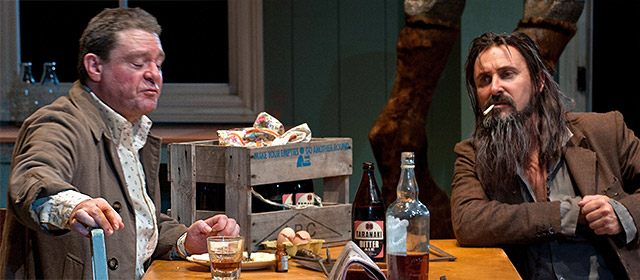Story summary
First New Zealand plays
The first original play staged in New Zealand may have been Marcilina, or the maid of Urmindorpt, performed in Wellington in 1848. In the later 19th century a few plays included local content.
In 1933 the New Zealand branch of the British Drama League ran a competition for one-act plays. However, few of these plays were ever performed. Radio broadcasts were a more reliable source of money for playwrights than the theatre.
Mid- and later 20th century
In the 1950s and 1960s Frank Sargeson, Allen Curnow and James K. Baxter (the latter two better known as poets) wrote a number of plays. The tree, by Stella Jones, was performed in England and by the New Zealand Players in New Zealand. Later literary authors who also wrote plays included Witi Ihimaera and Albert Wendt.
From the mid-1950s till the early 1980s Bruce Mason was New Zealand’s dominant playwright. His work included the Māori-themed The pohutukawa tree and the monologue The end of the golden weather.
Professional theatres opened in the 1960s and playwrights had more regular work. Roger Hall’s first play, Glide time, was performed in 1976. Hall went on to have a long career writing comic plays.
In the 1970s some theatre companies wrote plays collectively.
Māori and Pacific theatre
The first play by a Māori writer was Te raukura by Harry Dansey (1972), about the Taranaki prophets Te Whiti and Tohu. In 1979 theatre group Maranga Mai made a splash with their play about Māori land-rights protests.
In the 1980s new Māori playwrights made an impact, including Rawiri Paratene, Riwia Brown and Apirana Taylor. From 1990 Taki Rua theatre focused on Māori theatre. It encouraged playwrights including Hone Kouka and Briar Grace-Smith.
Te Haumihiata Mason translated Shakespeare’s Troilus and Cressida into Māori for performance in London.
In the 1990s Pacific authors also began writing drama.
Social issues
In 1973 Playmarket was set up to support playwrights. Its workshops fostered important new playwrights, including Greg McGee (who wrote the 1980 play Foreskin’s lament, about rugby and masculinity) and the feminist writer Renee. In the 1980s theatre explored feminist issues including rape, childbirth, homosexuality and striptease.
Into the 2000s
Ken Duncum, Michelanne Forster, David Geary, Vivienne Plumb and Duncan Sarkies all began writing plays in the 1990s and continued in the 2000s. Jacob Rajan and Justin Lewis created dramas focusing on Indian culture. Companies continued to write plays collectively, and some included circus and puppetry.





